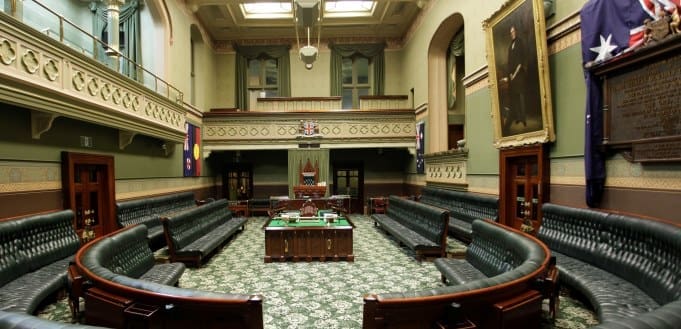Following the news last week that the recently aired Season 11 of Masterchef will be the last one hosted by Gary Mehigan, George Calombaris and Matt Preston, rumours have circulated about the reasons for their departure.
All we know for sure is that contract negotiations broke down between Network Ten and the three judges.
It has been reported that the three judges, each being paid $1 million a year, demanded a 40% pay increase that Network Ten wasn't prepared to accept. However, Matt and Gary have denied that the negotiations broke down because of money.
Many commentators have noted that the timing indicates George Calombaris’ under-payment scandal may have played a role. Calombaris was recently fined a $200,000 ‘contrition payment’ for underpaying hundreds of workers at his restaurants a total sum of $7.83 million. Considering that $200,000 is approximately 2.5% of the $7.83 million Calombaris owed workers, some people have criticised the figure as being too low. The President of the Australian Council of Trade Unions has said “While anyone else would face prison time for theft of millions of dollars, employers routinely steal huge amounts from working people and get away with simply returning the money they have stolen and paying a paltry fine." The pressure on Network Ten from unions to fire Calombaris continued to build in the week leading up to the announcement that the trio of judges was leaving Masterchef. George Calombaris' full interview on ABC's 7.30 will air tonight (31 July 2019), but to see a preview in which he apologises for underpaying staff, click here.
Now we are left with two questions. Firstly, who will host Masterchef next year? Secondly, and more importantly, what is an adequate penalty for such extreme wage theft?
Wage theft is never okay. If you feel like you have not be paid fairly for your work, or that an employer has taken advantage of your labour, please contact Freedman & Gopalan Solicitors on (02) 8917 8700 or via the enquiry form on the website. If you are not sure what is the correct award for your industry, check with Fair Work Australia's Pay Calculator.
The topic of death is a tricky one to navigate, especially when it is the result of unusual circumstances.
Coroners play an important role in investigating certain deaths, fires and explosions, by collecting and examining evidence and making findings. During this process, coroners must delicately balance the rights of the public and the rights of individuals against each other.
It is important to protect the privacy of individuals, especially the deceased, who can no longer speak for themselves. Coroners must also navigate between the families right to privacy, whilst informing them of the circumstances surrounding their loved ones death.
The process
Once a death is reported, the coroner begins the process of investigating the circumstances of the death to establish the medical cause of death. This may involve a coronial investigation, or an inquest.
Reportable deaths include deaths where:
- The person’s identity is unknown
- The death was violent or unnatural
- The death happened in suspicious circumstances
- A ‘cause of death’ certificate hasn’t been issued
- The death was related to health care
- The death occurred in care, custody or as the result of police operations
Coronial investigations or inquest?
(a) Investigation
Generally, when a death occurs, the death is reported to the coroner by the police, or medical practitioner, who attends the scene.
Once a death is reported, the coroner investigates the circumstances of the death to establish the identity of the deceased and the medical cause of their death. In most cases, the coroner will order an autopsy to help determine how and why the person died. Once the autopsy is complete, the body of the deceased is released to the family for burial and a copy of the coroner’s written findings is sent to the family.
During this period of investigation, the coroner has wide powers of investigation, and can request additional reports or information from police, doctors, engineers as well as professional inspectors and witnesses. A coroner can also decide whether to hold an inquest into the death, either on their own accord or at the request of the family.
(b) Inquests
An inquest is a court hearing where the Coroner considers evidence to determine the identity of the deceased and the date, place, manner and cause of death of the deceased.
It is important to understand that not all deaths will be the subject of a coronial inquest. Rather, very few coronial investigations proceed to inquest.
An inquest must be held if:
- Death occurred in custody
- Death occurred as a result of police operations
- State coroner orders that an inquest is to be held
- There is a request in writing to the coroner which successfully outlines why it is in the public’s best interest to conduct an inquest
As well as making findings concerning the cause and manner of the death, the Coroner’s Court uses an inquest to make recommendations to Government agencies and regulatory bodies. Such recommendations are aimed at preventing future deaths in similar circumstances.
Consider the inquest into the death of Melissa King. The State Coroner’s Court of New South Wales found that Ms King had died as a result of the hospital system shortcomings. Upon attending Blacktown Hospital, Ms King was treated for vomiting and later died as a result of sodium and fluid overload. In light of these events, the inquiry recommended the introduction of a New Clinical Handover Policy which outlines that core observations of a patient must be conducted at a minimum 3 times per day.
If you have been affected by any of the issues raised in this article, please do not hesitate to contact Freedman & Gopalan Solicitors on (02) 8999 9837 or by email to reception@freedmangopalan.com.au to discuss your legal avenues!
Market darling turned embattled franchisor Domino’s Pizza has become the latest stalwart in the scandal-plagued sector to be hit with a class action lawsuit. The restaurant is currently under fire for allegedly having its franchisee employees work without entitlements including 25 per cent loading for casual work, penalty rates or uniform cleaning allowances. This is because delivery drivers and in-store workers at Domino’s restaurants are not being properly paid under the Fast Food Industry Award and as such, they are being paid less than what they should be paid. According to Retail and Fast Food Workers Union (RAFFWU) secretary Josh Cullinan, who was involved in the investigation into a Fair Work Commission case which terminated more than 20 outdated Domino’s enterprise agreements in late 2017, believes more than 10,000 workers are being underpaid.
Federal Court proceedings against the fast-food giant, alleging franchisees underpaid thousands of workers at its direction, has initiated. The class action seeks the difference between the wage paid under the “inapplicable employment agreements” and relevant Award wages. A Statement of Claim filed with the Court on 24 June 2019 claims Domino’s misled or deceived franchisees, by telling them to pay workers under outdated enterprise agreements for almost five years. It is also alleged that “Domino's misled franchisees who, in reliance upon Domino's representations and conduct, paid their employees in accordance with a number of industrial agreements rather than under the Fast Food Industry Award 2010".
The lead applicant claims compensation against Domino’s for alleged underpayment by the lead applicant’s franchisee employer. Also, the lead applicant has not made any claim against his franchisee employer and no franchisee employer is a party to the action. The documents do not quantify any loss by the lead applicant or the alleged group and thus Domino’s rejects the allegation made in the documents and intends to defend the action.
As of 24 June 2019, the nation’s largest pizza company confirmed it still had not been served with the class action court documents, but it did have an unsealed copy of documents reportedly filed in the Melbourne Registry of the Federal Court Australia on the 24 of June 2019. Domino’s claims it is of the view that “those industrial agreements applied to its franchisees at all relevant times” and that “it did not mislead its franchisee employers as to their employee payment obligations”. Conclusively, the company denies it misled franchisees over employee payments terms and has reiterated plans to defend the class action.
If you think your employer is underpaying their staff, or you have otherwise been unfairly treated in the workplace, please do not hesitate to contact Freedman & Gopalan Solicitors on (02) 8999 9837 or by email to reception@freedmangopalan.com.au to discuss your legal avenues!
The Australian Competition and Consumer Commission (ACCC) has initiated proceedings in the Federal Court against Samsung Electronics Australia Pty Ltd (Samsung) for breaches of the Australian Consumer Law. The consumer watchdog alleges the company made false, misleading and deceptive representations in advertising the water resistance of various ‘Galaxy’ branded mobile phones across more than 300 advertisements since February 2016. The tech giant has widely advertised on a variety of platforms including social media, online, TV, brochures, radio and sponsored articles about the water resistance of their Galaxy smartphones including the fact that the phones are water resistant up to 1.5 metres deep for 30 minutes (example shown right). The ACCC alleges that these Samsung advertisements falsely and misleadingly represented Galaxy phones as being suitable for use in, or for exposure to, all types of water including in ocean water and swimming pools and would not be affected by such exposure to water for the life of the phone, when this is not the case.
The ACCC claims Samsung did not have a reasonable basis for making the representations because:
- It did not test or know of testing (or sufficient testing) about how exposing a Galaxy phone to water (including non-fresh water) affected its usable life;
- It held the view that using Galaxy phones in liquid other than fresh water could damage them. For example, Samsung’s website states that the new Galaxy S10 phone range is ‘not advised for beach or pool use';
- It has denied warranty claims from consumers whose phones were damaged when used in water.
Aside from not having a reasonable basis, the ACCC also claims that the representations are false, misleading and deceptive, because the Galaxy phones were not suitable for use in all types of water, and the life of the phones could or would likely be adversely affected if used in water (including non-fresh water)
Samsung itself has acknowledged that water resistance is an important factor when it comes to consumer decisions as this feature has a considerable influence over what mobile phone people will purchase. As such, Samsung’s advertisements are believed to have denied customers an informed choice which in the process gave the company an unfair competitive advantage. Under the Australian Consumer Law, businesses cannot mislead consumers about their product’ capabilities and as Samsung showed their Galaxy phones used is situations they shouldn’t be to attract customers, they are consequently breaking this law.
Samsung intends to defend the proceeding, standing by its marketing and advertising of the water resistance of its smartphones. The ACCC is seeking penalties, consumer redress orders, injunction, declarations, publication orders, an order as to findings of fact and cost.
If you would like to discuss any issues raised in this article, please do not hesitate to contact our team at Freedman & Gopalan Solicitors, on 02 8999 9837 or fill out the enquiry box and we will get back to you ASAP.
The impact of increasing greenhouse gas ("GHG") emissions resulting from human activities has driven innovation in market-based solutions, technology development and international law. The signing of the 1997 agreement known as the ‘Kyoto Protocol’, which was set to go into force in 2005, set binding emission reduction targets for the countries that signed it. This consequently resulted in the creation of carbon credits and the mechanism of emission trading.
What are Carbon Credits?
A carbon credit (also known as a carbon offset) is a tradable permit or certificate which grants a holder whether that be a country, company or organisation to produce carbon dioxide or other greenhouse gases. The credit limits the emission to a mass equal to one ton of carbon dioxide, ultimately serving the purpose as a market-oriented mechanism to slow worldwide carbon emissions.
How do Carbon Credits work?
Fundamentally, a carbon credit functions as a permit – issued by a government or other regulatory body which allows the holder to burn a specified amount of hydrocarbon fuel over a specified period. Each carbon credit is valued against one ton of hydrocarbon fuel with each company or nation being allotted to a certain number of credits. These credits function in two ways; the compliance or cap-and-trade market and voluntary market.
Compliance – Government agency puts a cap on GHG emissions for specific entities. Entities are required by law to strictly abide by this limit and are allowed to sell credits to other entities if the entity can cut back on emission below the requirement level required by law.
Voluntary – Any person or entity can balance out their carbon emissions by bankrolling projects that spearhead campaigns geared towards reducing greenhouse gas emissions.
Pros of Carbon Credits:
- Sends a clear statement of intent – Carbon offsetting gives a solid statement and credibility to minimise GNG emissions. It’s practical as it goes beyond the usual talk and target setting associated with policy making.
- Makes old businesses relevant in the modern day – Carbon offsetting saves a large number of old business from closure by restricting the GNG emissions of the entity consequentially forcing the company to add accessories or fine tune their operations to achieve higher efficiency.
- Quantifies the actual damage caused by greenhouse gas emissions – Paying for carbon offsets can quantify the real cost of damage done to the environment by greenhouse gasses. Governments and other institutions can use this data to formulate accurate budgets around carbon neutrality.
Cons of Carbon Credits:
- Investment in cleaner and carbon-free processes could be overlooked – Buying carbon credits could be leveraged as means to dodge the need to minimise emissions by simply purchasing credits with zero investment in clean renewable energy.
- Fewer beneficiaries – Main beneficiaries of carbon offset schemes are the traders, NGOs and Lawyers with project developers, who are the brain behind the project, receiving little to no benefit.
- Complex red tape – It can take months for project developers to go through complex red tape to attain the necessary permits.
If you would like to discuss any issues raised in this article, please do not hesitate to contact our team at Freedman & Gopalan Solicitors, on 02 8999 9837 or fill out the enquiry box and we will get back to you ASAP.
With a growth in technology in the past 10 years, online marketplaces have experienced a significant economic boom. Although significant in their ability to reach a wide range of consumers, the growth of ecommerce has resulted in unforeseen challenges. Particularly, the creation of the cryptocurrency, ‘Bitcoin’.
What is Bitcoin?
Bitcoin is a form of cryptocurrency which enables payments to be sent between users electronically.
Bitcoins can be used to book hotels on Expedia, buy gaming software and equipment or even shop for furniture.
Why Bitcoin?
- Bitcoins have become an increasingly attractive form of currency as it allows consumers to purchase merchandise anonymously.
- By using free software, consumers can buy or sell bitcoins without passing through a central authority, such as a bank or payment gateway. This attracts people who are uncomfortable with the control that banks or government institutions have over their money.
- International payments are also made easier with Bitcoins, as they surpass any country’s regulation and are not subject to any credit card fees.
- Bitcoin is a decentralised system of commerce. This means that no single institution controls the Bitcoin network.
The problem with Bitcoin?
- The operation of cryptocurrency is mostly unregulated
- Governments are concerned about taxation and their lack of control over the currency
- The anonymity of bitcoin has created a currency of choice for people to buy drugs or participate in other illicit activities online
- Bitcoin wallets are not insured by the Federal Deposit Insurance Corporation (FDIC) which means consumers funds are left vulnerable. A consumer who stores their funds in the cloud run the risk of having their servers hacked and funds stored on the computers of consumers can be destroyed by electronic viruses.
- Bitcoin transactions cannot be reversed, unlike electronic transactions as there is no central adjudicator which would authorise this return
If you would like to discuss any issues raised in this article, please do not hesitate to contact our team at Freedman & Gopalan Solicitors, on 02 8999 9837 or fill out the enquiry box and we will get back to you ASAP.
The Demerit Points System is a national program that allocates penalty points for a range of driving offences. The scheme is designed to encourage safe and responsible driving by imposing financial penalties on drivers who drive outside the law.
How do demerit points work?
The demerit point scheme is administered by the New South Wales Roads and Maritime Services.
It allocates penalties which are known as demerit points. If you accumulate a specified number of demerit points within the 3-year period, your license will be automatically suspended.
If you have an unrestricted licence, you are allowed up to 13 points within a 3-year period. This increases to 14 points for professional drivers (such as truck drivers or bus drivers).
Each time you commit a driving offence, you will receive a notification in the mail along with the penalty notice. Points will be added to your license, and if it reaches the maximum number of points, you will receive a notice of suspension which will specify how long your drivers’ licence will be suspended.
Although demerit points are no longer counted after 3 years, they remain on your driving record permanently.
What are the demerit point limits?
The limits are:
- Unrestricted licence: 13 points
- Professional drivers: 14 points
- P2 licence: 7 points
- Learner licence: 4 points
What are the suspension periods?
For unrestricted licence holders, the period of suspension depends on the number of points you accumulate:
- 13 to 15 points: 3 months suspension
- 16 to 19 points: 4 months suspension
- 20 or more points: 5 months suspension
For both learner, P1 and P2 licence holders, the suspension period is 3 months.
What are the double demerit periods?
Double demerit points apply for speeding, failure to wear a seatbelt, motorcycle helmet and use of mobile phones during all holiday periods such as long weekends, Christmas, New Year and Easter.
How do you find out your demerit points balance?
You can check your demerit points balance online on the NSW Roads & Maritime Services website (click here).
What happens if you do not pay your penalty notice fine?
If you fail to pay your penalty notice fine by the due date, you will be issued with an enforcement order. You will also face the penalty of additional demerit points for a failure to pay the fine.
Your driver licence can also be suspended under the Fines Act 1996 if you do not pay your outstanding penalty notice.
Electronic Conveyancing (e-Conveyancing) is an electronic way of conducting property settlement and lodgement. By replacing paper processes, it allows lawyers, lenders and conveyancers work together online and speeds the process up. E-Conveyancing sites can also create documents pre-populated with the relevant information, and the parties involve can just cross-check and approve the information.
Soon there will be no paper certificate of title. Once settlement occurs online, the title issued is called an eCT, and works just like a paper CT.
What is PEXA
PEXA stands for Property Exchange Australia Limited. On PEXA’s national eConveyancing platform, parties can prepare and electronically sign the registry instruments (including the transfer, mortgage and release of mortgage), lodge registration documents and make payment of the purchase price. PEXA does not only facilitate property transfers, but other dealings with property such as lodging and withdrawing caveats.
Is it safe?
E-Conveyancing sites such as PEXA allow the participants to enter a secure, online workspace. In fact, it is hoped that eConveyancing will reduce risks of errors and fraud. By reducing delays, the risk inherent in any delay is reduced. Moreover, between 2013 and 2018, the NSW Registrar General paid out more than $2 million for errors in paper transactions, and over $7 million for paper fraud. The paper system has issues that will be avoided by eConveyancing.
A legal practitioner cannot conduct a conveyance for you without your written Authorisation, and there are steps taken to identify the client to avoid identity theft.
If you would like assistance in a property dealing, please do not hesitate to contact our team at Freedman & Gopalan Solicitors, on 02 8999 9837 or fill out the enquiry box and we will get back to you ASAP.
The recent debate in Alabama, USA in relation to abortion prohibitions with no exception for rape or incest, has brought New South Wales’ abortion laws into the spotlight.
New South Wales remains the only state or territory in Australia, to treat abortion as a criminal offence subject to exceptions. These exceptions are found in the decision of R v Wald [1971] which finds abortion to be lawful if a doctor believes that a woman’s physical or mental health would be in danger. While this would consider the social, economic and medical factors involved in the case, women are still not entitled to abortion on request.
Reasons for decriminalising abortion
A study conducted in collaboration with The World Health Organisation (WHO) and the Guttmacher Institute found that abortion rates are similar in countries where it is legal and where it is illegal, showing that criminalising abortion only contributes to the rise of unsafe abortions rather than a decline in the actual abortion rate. The decriminalisation of abortion is thus in the interest of safe healthcare. The 'WHO' estimates that 22 million unsafe abortions occur each year worldwide. As these are not conducted by a trained medical professional, they often have fatal consequences. The WHO has found that unsafe abortions are the third leading cause of maternal deaths globally and liable for another 5 million preventable disabilities.
Moreover, from a social and ethical perspective, compelling a woman to carry a child until delivery, infringes upon her bodily autonomy and thus, her human rights. From being unable to afford to carry or deliver a child, to being mentally unprepared to raise one, there are many reasons why women may not want to have a pregnancy to term. While some may suggest adoption as a viable alternative, in Australia, only 209 children out of the estimated 40, 000 children put up for adoption are adopted each year.
Hence, an increasing number of states and countries have been decriminalising or legalising abortion with more than 30 countries doing so in the past 60 years according to Amnesty International. With Queensland decriminalising abortion as of 2018, NSW remains the last state criminalising abortion.
The Position of the NSW Government
Despite NSW’s Premier, Gladys Berejiklian’s support for a women’s right to choose, she has clarified that she would need to see what the legislation looks like first. She has also stated that the MPs would be provided with a conscience vote on the decriminalisation of abortion if a bill comes before the Parliament.
This issue combines both legal and ethical concerns, and so it will be interesting to see the results of a conscience vote, especially considering the risks inherent in unsafe abortions and the other approaches available to reducing abortion rates, such as accessible contraception and education programs.









